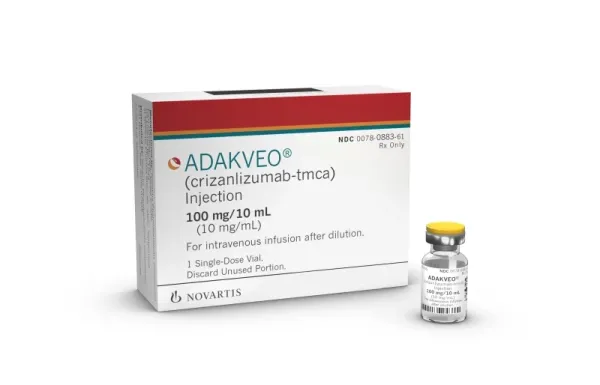Crizanlizumab
Generic name: crizanlizumab [ KRIZ-an-LIZ-ue-mab ]
Brand name: Adakveo
Dosage form: intravenous solution (tmca 10 mg/mL)
Drug class: Miscellaneous uncategorized agents
What is crizanlizumab?
Crizanlizumab is used in people with sickle cell disease to reduce how often certain episodes (vaso-occlusive crises) occur.
Crizanlizumab is for use in adults and children at least 16 years old.
Crizanlizumab may also be used for purposes not listed in this medication guide.
Crizanlizumab side effects
Get emergency medical help if you have signs of an allergic reaction: hives; difficult breathing; swelling of your face, lips, tongue, or throat.
Some side effects may occur within 24 hours after you receive crizanlizumab. Call your doctor if you feel dizzy, nauseated, tired, itchy, chilled, sweaty, or have a fever, wheezing, or shortness of breath.
Common side effects of crizanlizumab may include:
-
stomach pain or tenderness;
-
fever;
-
joint pain; or
This is not a complete list of side effects and others may occur. Call your doctor for medical advice about side effects. You may report side effects to FDA at 1-800-FDA-1088.
Related/similar drugs
Hydrea
Hydrea is used for chronic myelogenous leukemia, head and neck cancer
Ozempic
Learn about Ozempic (semaglutide) for type 2 diabetes treatment, weight management, cardiovascular ...
Adakveo
Adakveo (crizanlizumab-tmca) is used for the prevention of vasoocclusive crises (VOCs) in patients ...
Aquasol E
Aquasol E is used for alzheimer's disease, cystic fibrosis, dietary supplementation, nocturnal leg ...
Xromi
Xromi (hydroxyurea) is an oral solution that may be used to reduce the frequency of painful crises ...
Glutamine
Glutamine is used for dietary supplementation, short bowel syndrome, sickle cell anemia
Warnings
Some side effects may occur within 24 hours after you receive this medicine. Tell your caregiver if you feel dizzy, nauseated, tired, itchy, chilled, sweaty, or have a fever, wheezing, or shortness of breath.
Before taking this medicine
Tell your doctor if you are pregnant or plan to become pregnant. Having sickle cell disease during pregnancy may increase the risk of premature birth or low birth weight. The benefit of treating sickle cell disease may outweigh any risks to the baby.
Ask a doctor if it is safe to breastfeed while using crizanlizumab.
How is crizanlizumab given?
Crizanlizumab is given as an infusion into a vein. A healthcare provider will give you this injection.
This medicine must be given slowly, and the infusion can take about 30 minutes to complete.
Your doctor may prescribe other treatments while using crizanlizumab.
Crizanlizumab is usually given once every 2 to 4 weeks. Follow your doctor's dosing instructions very carefully.
Do not stop using this medicine without your doctor´s advice.
This medicine can affect the results of certain medical tests. Tell any doctor who treats you that you are using crizanlizumab.
Crizanlizumab dosing information
Usual Adult Dose for Sickle Cell Anemia:
Initial dose: 5 mg/kg via IV infusion every 2 weeks for 2 doses, then
Maintenance dose: 5 mg/kg via IV infusion every 4 weeks
Comments:
-This drug may be given with or without hydroxyurea.
-Use patient's actual body weight for dose calculation.
Use: To reduce the frequency of vasoocclusive crises in patients 16 years or older with sickle cell disease.
Usual Pediatric Dose for Sickle Cell Anemia:
16 years or older:
Initial dose: 5 mg/kg via IV infusion every 2 weeks for 2 doses, then
Maintenance dose: 5 mg/kg via IV infusion every 4 weeks
Comments:
-This drug may be given with or without hydroxyurea.
-Use patient's actual body weight for dose calculation.
Use: To reduce the frequency of vasoocclusive crises in patients 16 years or older with sickle cell disease.
What happens if I miss a dose?
Call your doctor for instructions if you miss an appointment for your crizanlizumab injection.
What happens if I overdose?
Since crizanlizumab is given by a healthcare professional in a medical setting, an overdose is unlikely to occur.
What should I avoid while receiving crizanlizumab?
Follow your doctor's instructions about any restrictions on food, beverages, or activity.
What other drugs will affect crizanlizumab?
Other drugs may affect crizanlizumab, including prescription and over-the-counter medicines, vitamins, and herbal products. Tell your doctor about all other medicines you use.
Crizanlizumab Biosimilars
Biosimilar and interchangeable products are biological products that are highly similar to and have no clinically meaningful differences from the reference product.
Reference products
These are biological products that have already been approved by the FDA, against which biosimilar products are compared. There is 1 for crizanlizumab.
Adakveo (crizanlizumab-tmca) - Novartis Pharmaceuticals Corporation
| Formulation type | Strength |
|---|---|
| Single-Dose Vial | 100 mg/10 mL (10 mg/mL) |
View Adakveo information in detail.
Popular FAQ
What type of drug is Adakveo and how does it work?
Adakveo injection is a targeted biologic P-selectin inhibitor that blocks interactions between certain blood cells and blood vessels to make them less “sticky”. This helps to reduce how often painful crises occur in patients with sickle cell disease. Continue reading
How is Adakveo administered?
Adakveo is administered by an intravenous (IV) infusion over 30 minutes. The correct dose of Adakveo for you will be mixed in a sterile IV bag containing 0.9% Sodium Chloride for injection or 5% Dextrose for injection and given directly into your vein via a small, hollow, plastic tube called a cannula. Adakveo cannot be self-administered at home, it must be prepared and administered by a health professional. Continue reading
More about crizanlizumab
- Check interactions
- Compare alternatives
- Side effects
- Dosage information
- During pregnancy
- Drug class: miscellaneous uncategorized agents
- Breastfeeding
- En español
Patient resources
Other brands
Professional resources
Other brands
Related treatment guides
Further information
Remember, keep this and all other medicines out of the reach of children, never share your medicines with others, and use this medication only for the indication prescribed.
Always consult your healthcare provider to ensure the information displayed on this page applies to your personal circumstances.
Copyright 1996-2025 Cerner Multum, Inc. Version: 3.01.

